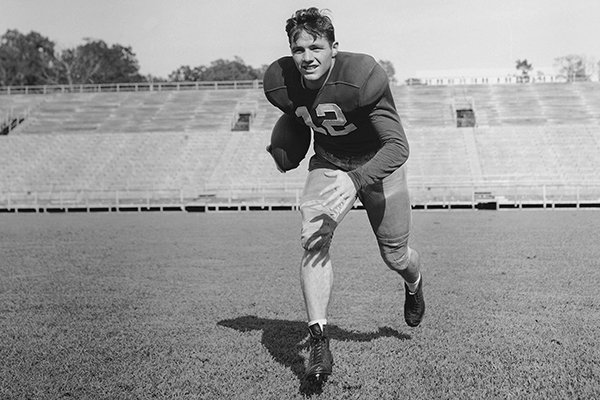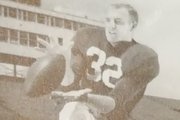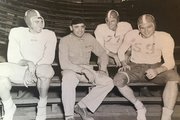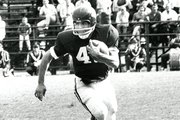FAYETTEVILLE — Football isn't track. Speed isn't the only thing required to be great on the grid iron, but it sure does help.
That much jumps to the front as more are found with firsthand knowledge of what Clyde Scott did for the Arkansas football team in 1946-48, becoming the first All-American of the modern era. He set the school record with 1,463 rushing yards. He averaged 7.0 yards per carry as a senior.
An NCAA champion in the 110-meter hurdles, Scott won a silver medal in the '48 London Olympics and then played four years in the NFL after going seventh overall in the draft. Scott, 93, died at his home last week in Little Rock.
What Scott did for coach John Barnhill's Arkansas defense from the safety position was just as important as his great offensive play. Scott ran down ball carriers, sideline to sideline. If there is anywhere Scott could help the current Arkansas team, it would be there.
When you talk to those who saw Scott play, it was his galvanizing play on defense that stood out, something that was evident as a defensive back in pro football with the Eagles.
Floyd Sagely saw Scott play. He called him his hero, even in business. Sagely worked for Scott in the insurance business during his pro football career in San Francisco.
Sagely, a successful Fort Smith businessman, admired Scott as a teenager.
“First, I'll say that I had a lot of other opportunities as far as where to go to college, maybe 30, but the reason I wanted to play at Arkansas was because of Clyde Scott,” Sagely said. “I was in high school and I so admired him as a player. He was my hero.
“Clyde Scott was my inspiration. We went to Fayetteville for about every game we could and it was to see Clyde Scott.
“You probably don't realize it so much at the time who is influencing your life the most, but later as I look back it was clearly Clyde Scott. He was so important to me.
“I was fortunate to work with him in the off-season during my time with the 49ers. We sold life insurance and I went with him on calls. I learned how you should operate in business. It wasn't high pressure. He was never a hard sell.
“Clyde was almost shy, but when he sat in front of someone, the pen was in his hand ready and he knew when it was the right time.”
Obviously, Scott was one of the fastest Razorbacks ever. Sagely said there is no substitute for raw speed. He said Scott's backfield teammate, Aubrey "Cob" Fowler, was not much slower.
"I think if Clyde was 9.4, then Cob was 9.5 or 9.6," Sagely said. "What a great combination. And, you had Muscles Campbell as a pretty fast one, too, and an incredible blocker. But all three of them were really fast."
That's the goal all across the defensive backfield, too. Sagely wants more speed for the Hogs.
“My philosophy in football is that power is good, but it's awful hard to beat speed," Sagely said. "You build your team there. The great Arkansas teams have always had that.
“Look for speed, then concentrate on conditioning. I think I see that is the philosophy of our new coach, Chad Morris. I so agree with him. I felt like that was our problem the last few seasons.”
That's not to say Sagely didn't respect Bret Bielema, the UA coach the last five seasons.
“No doubt, he was a good guy,” Sagely said. “But I think we lacked speed and conditioning. Power is important. You have to have it.
“But I like the philosophy that is built on deception and speed. I like the idea of having multiple backs. I want both to get the ball. When I played defensive back and I saw only one setback, I knew where to key. You spy on him at all times and I could get him.”
Sagely was a great two-way player, an end and back lettering in 1951-53. He was All-SWC in '53, leading the league with 30 receptions and also leading the Hogs in interceptions. He is probably the last UA athlete to start in football and basketball three straight years (when freshmen were not eligible). He's on the UA all-decade team.
“What got me most was deception,” Sagely said. “You do something that makes me hold my spot for a split second, it became much tougher to play defense. Just make that defensive player pause and you have the advantage. All it takes is a split second.
“You go power against power up front, the defensive lineman has the advantage. The offensive line has the advantage when a little deception is added. One instant is all it takes to get an angle for the block.”
The Morris philosophy is to drop some weight this off season in favor of more speed and agility. Sagely applauds.
“I played two sports, football and basketball (at Arkansas),” he said. “Basketball is running. Then, we had football off season, then basketball off season. There was six weeks of the year I wasn't running. That's the secret, the running.
“I don't know what the (NCAA) rules are now, but what I'd do is have my football team compete in basketball during the winter. I think it would solve the conditioning. It did for me. I think the players would like it, too. It was my biggest asset. I did that for four years.”
That was an interesting concept for another Arkansas legend, former coach and player Ken Hatfield. He doesn't argue with Sagely's assertion that speed is the key factor in football.
“It's everything,” he said. “Speed corrects mistakes and it's important at every position. It covers up poor technique. It's not just straight speed, but how quickly you can change directions and accelerate.”
There was no doubt in Hatfield's mind that Scott was good in both areas. Without great safety play, defenses wilt. Scott was one of the best.
“I didn't see him play in person,” said Hatfield, who played 14 seasons later. “But I read about him from as early as I can remember. I was in awe when I finally met him.
“I got to know him later in life at the (Arkansas Sports Hall of Fame) golf tournament. I always wanted to find him where he was hitting balls. You would find Clyde and (wife) Leslie side by side. That always impressed me.
“I think of the all-time great athletes in sports, I'd put Clyde Scott with the likes of Jim Thorpe. I wanted to read about both. Those were do-it-all athletes that were just phenomenal.”
As far as the Morris plans, Hatfield is with Sagely. More speed will help.
"I think he's trying to find more speed at linebacker," Hatfield said. "That's where these modern attacks put so much pressure.
"Find speed. Recruit it. Look for backs and linebackers and then work to put them in positions where they can impact the game with speed. I think that's what has made TCU's defenses so good. Gary Patterson does that. I think it works."
Yes, and if you can find a few 9.4 safety men, all the better. Unfortunately, those might be once-in-a-lifetime players.




